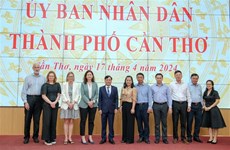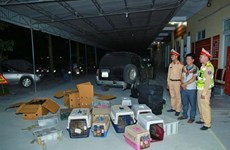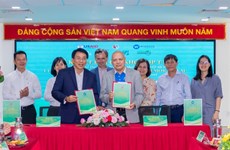HCM City adapts to climate change
Ho Chi Minh City has devised several solutions to adapt to global
warming and achieve green growth and sustainable development by 2020,
including a reduction of carbon dioxide emissions by 2 to 3 percent per
year.
Ho Chi Minh City has devised several solutions to adapt to global
warming and achieve green growth and sustainable development by 2020,
including a reduction of carbon dioxide emissions by 2 to 3 percent per
year.
Experts said HCM City is among 10 cities worldwide vulnerable to climate change, especially rise in sea levels.
The city began taking numerous measures to mitigate the diverse impact of climate change after the Government adopted a decision on building a national action plan against climate change in 2013.
The city's Steering Committee for Climate Change was recently asked by city officials to create an action plan against climate change from now to 2020, with a vision to 2030. The action plans will focus on numerous areas, including urban planning, energy, transport, industry, water management, waste management, agriculture, healthcare, construction and tourism.
Under the plan, assessment of climate-change impact will be based on weather changes, such as increases in temperature and rainfall.
Ha Minh Chau, Deputy Head of the municipal Office on Climate Change, said it was vital to accurately assess how climate change will affect each field like transport and waste management.
Under the plan, the city will develop projects to adapt to climate change, such as a metro subway system, an environmentally-friendly bus rapid-transit system, a wastewater treatment plant, and plants that generate power and bio-gas from solid waste. In a related matter, Vietnam and Japan have signed a Joint Credit Mechanism, an initiative that will promote advanced low-carbon technologies, products, systems, services and infrastructure.
Two projects, which would be financed by the joint effort, include a power plant that will burn solid waste, with a capacity of 500–1,000 tonnes a day, and a total investment of 200-250 million USD.
The other project will produce bio-gas and generate power by recycling solid waste at the Binh Dien farm produce wholesale market, with an investment of 178 billion VND (8.31 million USD).
In addition, the city will develop projects to collect, treat and re-use rain water for various purposes, especially to reduce flooding, and will re-use treated household wastewater. The city also plans a solar-power system in Can Gio District, an efficient water-usage system, and a public awareness campaign about climate change.
In recent years, climate change has occurred more frequently in the city, with more stormy weather and higher tides, affecting households and businesses.-VNA
Experts said HCM City is among 10 cities worldwide vulnerable to climate change, especially rise in sea levels.
The city began taking numerous measures to mitigate the diverse impact of climate change after the Government adopted a decision on building a national action plan against climate change in 2013.
The city's Steering Committee for Climate Change was recently asked by city officials to create an action plan against climate change from now to 2020, with a vision to 2030. The action plans will focus on numerous areas, including urban planning, energy, transport, industry, water management, waste management, agriculture, healthcare, construction and tourism.
Under the plan, assessment of climate-change impact will be based on weather changes, such as increases in temperature and rainfall.
Ha Minh Chau, Deputy Head of the municipal Office on Climate Change, said it was vital to accurately assess how climate change will affect each field like transport and waste management.
Under the plan, the city will develop projects to adapt to climate change, such as a metro subway system, an environmentally-friendly bus rapid-transit system, a wastewater treatment plant, and plants that generate power and bio-gas from solid waste. In a related matter, Vietnam and Japan have signed a Joint Credit Mechanism, an initiative that will promote advanced low-carbon technologies, products, systems, services and infrastructure.
Two projects, which would be financed by the joint effort, include a power plant that will burn solid waste, with a capacity of 500–1,000 tonnes a day, and a total investment of 200-250 million USD.
The other project will produce bio-gas and generate power by recycling solid waste at the Binh Dien farm produce wholesale market, with an investment of 178 billion VND (8.31 million USD).
In addition, the city will develop projects to collect, treat and re-use rain water for various purposes, especially to reduce flooding, and will re-use treated household wastewater. The city also plans a solar-power system in Can Gio District, an efficient water-usage system, and a public awareness campaign about climate change.
In recent years, climate change has occurred more frequently in the city, with more stormy weather and higher tides, affecting households and businesses.-VNA













